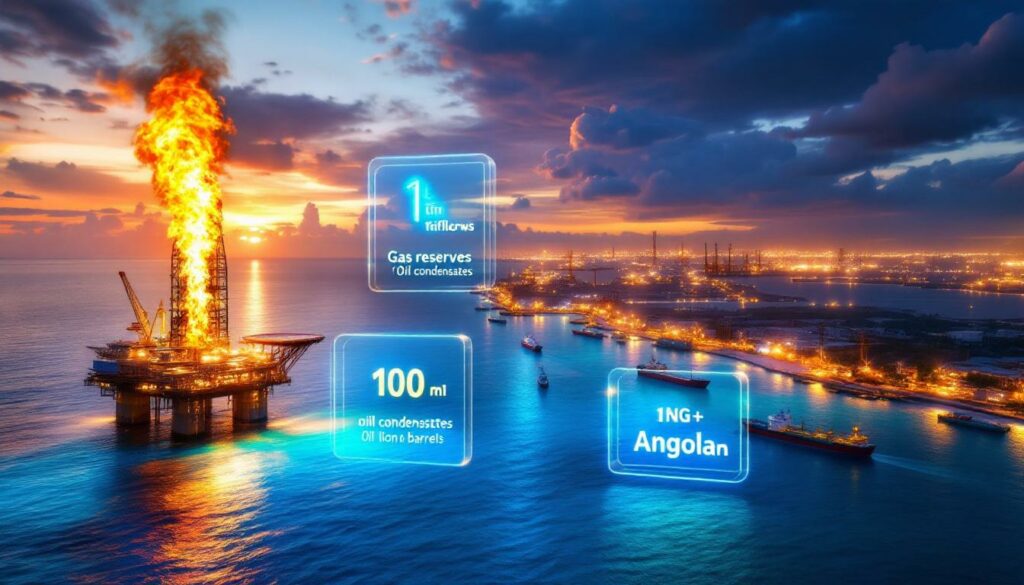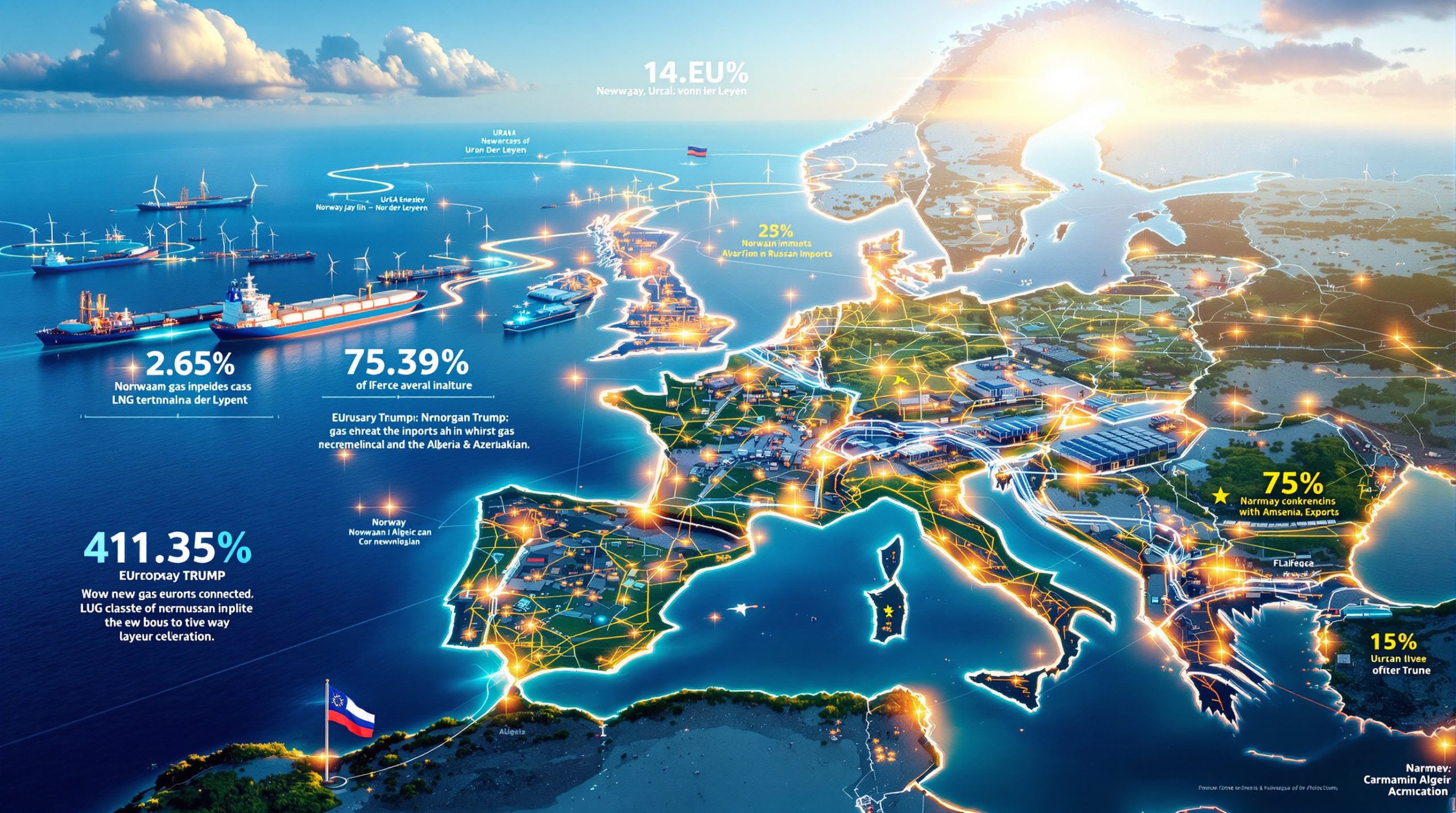What is Angola's Gas Discovery in the Lower Congo Basin?
Angola has made a groundbreaking natural gas discovery in the offshore Lower Congo Basin, marking a pivotal shift in the country's energy landscape. The exploration well, named "Gajajeira-01," has uncovered substantial natural gas reserves that could transform Angola from a primarily oil-focused producer to a significant player in Africa's natural gas sector.
The discovery, made by Azule Energy (a joint venture between BP and Eni), has revealed impressive preliminary estimates of over 1 trillion cubic feet of natural gas and approximately 100 million barrels of condensates. This marks the first time Angola has conducted dedicated gas exploration, with results far exceeding initial expectations.
This discovery is particularly significant because it occurs in the Lower Congo Basin, a geological formation already known for hydrocarbons but previously underexplored specifically for natural gas potential. The basin's characteristics suggest favorable conditions for commercial development, with relatively accessible depths compared to ultra-deepwater discoveries elsewhere in Africa.
"This is a historic moment for gas exploration in Angola," stated Adriano Mongini, CEO of Azule Energy. "The success of the Gajajeira-01 well strengthens our confidence in the untapped potential of the Lower Congo Basin."
The timing of this discovery aligns perfectly with Angola's strategic pivot away from exclusive oil dependency, particularly following its departure from OPEC in 2023. With existing oil infrastructure already in place throughout parts of the basin, Angola may be able to accelerate gas development timelines compared to completely greenfield projects.
How Significant is Angola's Gas Discovery?
Scale and Economic Impact
While the 1 trillion cubic feet estimate is substantial, it's important to place this in regional context. Neighboring Mozambique boasts over 100 trillion cubic feet of gas reserves, making it one of Africa's gas giants. However, Angola's discovery is still commercially significant and comes with several strategic advantages.
The discovery represents a critical piece of Angola's ambitious National Gas Master Plan, which aims to attract more than $30 billion in investments while generating approximately $150 billion in economic benefits over the next three decades. This long-term strategy envisions gas as a foundation for broader economic diversification.
From a fiscal perspective, the timing couldn't be better. Angola's crude oil export revenue in the first quarter of 2025 declined by 18% year-over-year to $6.4 billion, highlighting the urgent need for revenue diversification. Industry analysts project that Angola could generate $2-3 billion in annual LNG revenues by the late 2030s once production reaches capacity.
Strategic Advantages
Angola possesses several key advantages that make this discovery particularly valuable:
- Existing infrastructure: Unlike frontier gas producers, Angola can leverage some existing petroleum infrastructure
- Regulatory framework: The country's Law 10/14 prohibiting gas flaring provides environmental credibility
- Strategic location: Positioned to serve both European and Asian LNG markets with competitive shipping costs
- Political stability: Relative to some regional competitors, Angola offers a more stable investment environment
The Africa Finance Corporation (AFC) has specifically identified Angola alongside Nigeria as leaders in Africa's energy transition strategies, noting that both countries are pursuing pragmatic policies that balance hydrocarbon monetization with longer-term transition goals.
Regional Energy Security Implications
Beyond export potential, this discovery strengthens Angola's domestic energy security. Natural gas can support reliable power generation, industrial development, and fertilizer production—creating synergies between the hydrocarbon, mining, and agricultural sectors that are essential for Angola's diversification strategy.
Who is Behind Angola's Gas Discovery?
The Azule Energy Partnership
The successful exploration was conducted by Azule Energy, a 50-50 joint venture bringing together energy majors BP Plc and Eni S.p.A., alongside Angolan partners. Formed in 2022, this partnership represents one of Africa's largest independent energy companies with a portfolio of 16 licenses and participation in Angola LNG.
What makes this partnership particularly effective is the complementary expertise it brings together:
- BP: Global LNG expertise and trading capabilities
- Eni: Deepwater drilling excellence and established West African operations
- Angolan partners: Local knowledge and stakeholder relationships
The Angolan government maintains appropriate oversight through the Angola National Agency for Petroleum, Gas and Biofuels (ANPG), ensuring that development aligns with national interests while still attracting international investment.
Leadership Vision
Adriano Mongini, CEO of Azule Energy, has been instrumental in championing exploration in underexplored areas of Angola's offshore basins. His leadership has emphasized the importance of new exploration models that look beyond traditional oil targets to unlock Angola's full hydrocarbon potential.
"The discovery confirms our belief in the untapped potential of the Lower Congo Basin," Mongini stated, highlighting that this success validates Azule's exploration strategy and technical approach.
Investment Climate Improvements
This discovery was made possible through Angola's improved investment framework for energy exploration. Since 2018, the country has undertaken significant regulatory reforms designed to:
- Streamline approval processes
- Enhance fiscal terms for exploration
- Reduce bureaucratic barriers
- Create transparent bidding rounds
- Establish clearer rules for gas monetization
These changes, particularly following Angola's exit from OPEC in 2023, have created a more attractive environment for international energy companies to invest in both oil and gas exploration.
What Does This Mean for Angola's Economic Future?
The National Gas Master Plan
The gas discovery perfectly aligns with Angola's comprehensive 30-year National Gas Master Plan (NGMP), unveiled in 2024. This strategic roadmap aims to transform how Angola utilizes its natural gas resources through:
- Infrastructure development: Building processing facilities, pipelines, and export terminals
- Domestic utilization: Expanding gas-to-power generation and industrial applications
- Value-added industries: Developing petrochemicals, fertilizer, and methanol production
- LNG exports: Establishing Angola as a reliable supplier to international markets
The NGMP targets attracting over $30 billion in investments while generating approximately $150 billion in economic benefits over three decades. These benefits include direct revenues, job creation, infrastructure development, and multiplier effects across related industries.
Investment Momentum
Angola has already demonstrated its ability to attract significant energy investment. The country has secured commitments exceeding $60 billion from international financiers for the next five years, showing growing confidence in Angola's energy sector transformation.
This investment pipeline is crucial for developing the infrastructure needed to monetize the new gas discovery. Projects already advancing include:
- Expansion of existing LNG facilities
- New gas processing plants
- Pipeline infrastructure development
- Gas-to-power projects for domestic electricity
"Angola's regulatory reforms and resource potential have created a compelling investment case," notes the Africa Finance Corporation in its 2025 infrastructure report.
Beyond Hydrocarbons
While the gas discovery represents an important step toward diversifying away from oil dependence, Angola continues pursuing broader economic diversification. The country's parallel strategies include:
- Critical minerals development: Particularly diamond mining, where Angola ranks among Africa's top producers
- Agricultural expansion: Leveraging fertile land and water resources for food security and exports
- Infrastructure development: Ports, railways, and telecommunications to support broader growth
- Financial services: Modernizing banking and investment frameworks
This multi-pronged approach aims to reduce Angola's historical vulnerability to oil price volatility while creating more sustainable growth pathways.
How Will Angola Develop Its Gas Resources?
The New Gas Consortium
Angola has established the New Gas Consortium (NGC), the country's first dedicated non-associated gas development project. This consortium structure brings together international expertise with domestic participation, allowing for:
- Shared risk across multiple companies
- Pooled technical capabilities
- Coordinated infrastructure development
- Balanced sovereign interests
The NGC model provides the framework for developing the newly discovered resources in the Lower Congo Basin, ensuring that gas development proceeds in alignment with national priorities while still attracting necessary international capital and expertise.
Infrastructure Development Roadmap
To capitalize on the discovery, Angola must develop significant gas processing and transportation infrastructure. The country's strategic approach includes:
Phase 1 (2025-2028):
- Detailed resource assessment
- Front-end engineering and design (FEED)
- Final investment decision (FID)
- Initial infrastructure development
Phase 2 (2028-2031):
- Production platform installation
- Pipeline connections to existing infrastructure
- First gas production
- Domestic market supply prioritization
Phase 3 (2031-2035):
- Export infrastructure development
- LNG capacity expansion
- Full production plateau achievement
- Market diversification
This phased approach allows Angola to balance immediate domestic energy needs with longer-term export ambitions while spreading capital requirements over a manageable timeline.
Environmental and Regulatory Framework
Angola's gas development strategy is underpinned by Law 10/14, which prohibits routine gas flaring across all hydrocarbon operations in the country. This progressive regulatory framework ensures:
- Minimized greenhouse gas emissions
- Maximum resource utilization
- Environmental compliance from project inception
- Alignment with global best practices
The law requires operators to either reinject gas, use it for power generation, or commercialize it through appropriate infrastructure—eliminating wasteful flaring except in emergency situations. This approach positions Angola's gas development as relatively lower-carbon compared to some competing projects.
What Are the Regional and Global Implications?
Africa's Energy Transition Leadership
According to the Africa Finance Corporation (AFC), Angola and Nigeria are emerging as leaders in the continent's energy transformation. Their approach demonstrates how African nations can:
- Monetize hydrocarbon resources responsibly
- Use gas as a transition fuel for economic development
- Balance energy security with environmental considerations
- Create models for other resource-rich African nations
The development of Angola's gas resources could provide a template for other African nations seeking to navigate the complex balance between immediate economic needs and longer-term climate considerations.
Competitive Position in Global LNG Markets
Angola's proximity to major LNG markets positions it favorably as a supplier in an increasingly competitive global gas landscape:
| Market | Angola's Advantage | Competition |
|---|---|---|
| Europe | Shorter shipping routes than US Gulf Coast | Qatar, US, Algeria |
| Asia | Strategic shipping lanes via Cape of Good Hope | Australia, Qatar, US |
| Regional | Pipeline potential to neighboring countries | Mozambique, Tanzania |
Industry analysts project that Angola could generate $2-3 billion in annual LNG revenues by the late 2030s, providing a substantial boost to the country's foreign exchange earnings and reducing dependence on oil exports.
Regional Energy Integration
Beyond its national significance, Angola's gas discovery could contribute to broader regional energy integration through:
- Cross-border pipeline infrastructure
- Power generation and grid connections
- Regional gas trading hubs
- Shared processing facilities
These integration opportunities align with the African Continental Free Trade Area (AfCFTA) objectives of increasing intra-African trade and creating more interconnected energy systems across the continent.
How Does This Discovery Compare to Other African Energy Developments?
Major African Energy Milestones
Angola's gas discovery in the Lower Congo Basin occurs within a broader context of significant developments across Africa's energy landscape:
- Nigeria: The Dangote Refinery began gasoline production in 2024, marking the first time in decades that Africa's largest oil producer is refining its own crude domestically at scale (650,000 barrels per day)
- Mozambique: Despite security challenges, the Coral South FLNG project achieved first LNG cargo in 2022, with Area 1 and Area 4 developments advancing
- Senegal/Mauritania: The Greater Tortue Ahmeyim project represents West Africa's first deepwater gas development spanning national boundaries
- Tanzania: LNG projects are progressing after years of regulatory delays
Within this context, Angola's discovery represents a significant but not world-scale finding. Its 1 trillion cubic feet of gas is substantial by African standards but modest compared to Mozambique's 100+ trillion cubic feet of reserves or Nigeria's established position.
Development Timeline Comparison
Angola's gas development timeline will be influenced by several factors:
| Country | Project | Reserve Size | First Production | Current Status |
|---|---|---|---|---|
| Angola | Lower Congo Basin | 1+ Tcf | Est. 2030-2032 | Discovery phase |
| Mozambique | Coral FLNG | 16 Tcf | 2022 | Producing |
| Mozambique | Area 1 LNG | 32 Tcf | Est. 2028 | Under construction |
| Tanzania | Tanzania LNG | 57 Tcf | Est. 2030 | Pre-FID |
The phased development approach will likely see production capacity increase gradually over the next decade, with domestic utilization preceding significant exports.
Investment Climate Factors
Angola's ability to attract the necessary investment for full-scale development will depend on:
- Political stability: Maintaining consistent governance and regulatory frameworks
- Fiscal terms: Offering competitive terms while ensuring national benefits
- Infrastructure development: Creating necessary processing and transportation capabilities
- Market access: Securing long-term purchase agreements
The country's recent track record of securing energy sector investments suggests positive momentum, but competition for limited global capital remains intense among emerging gas producers. As industry evolution trends continue to shift, Angola must position itself strategically to capture investment opportunities 2025 in the evolving energy landscape.
What Challenges Must Angola Overcome?
Infrastructure Development Hurdles
Developing the necessary infrastructure to process, transport, and potentially liquefy the newly discovered gas reserves presents significant challenges:
- Capital requirements: The estimated $30 billion investment need exceeds typical annual FDI for Angola
- Technical complexity: Offshore development requires specialized expertise and equipment
- Timeline management: Coordinating multiple interconnected infrastructure elements
- Financing structure: Balancing sovereign guarantees with private investment returns
The remote offshore location adds logistical complexity, requiring specialized vessels, subsea expertise, and robust supply chains that can operate efficiently in West African waters.
Market Competition
Angola will face intense competition from established and emerging LNG exporters targeting the same key markets:
- Established exporters: Qatar, Australia, and the United States continue expanding capacity
- Emerging competitors: Mozambique, Tanzania, and expanded West African production
- Price competition: Lower-cost producers with existing infrastructure have advantages
- Contract flexibility: Buyers increasingly demand shorter-term and more flexible arrangements
Securing long-term purchase agreements will be essential for project financing and development certainty, but buyers' preference for shorter commitments creates tension in the development model.
Economic Diversification Imperatives
While the gas discovery represents an important step toward diversifying away from oil dependence, Angola faces broader economic challenges:
- Dutch disease risks: Resource focus potentially crowding out other sectors
- Currency management: Balancing export revenues with domestic inflation pressures
- Skills development: Building local technical capacity across multiple industries
- Infrastructure priorities: Balancing energy sector needs with broader development
The country's parallel goals in critical minerals (particularly diamonds) and agriculture must remain priorities to achieve genuine economic diversification rather than simply shifting from oil to gas dependency.
"True diversification requires moving beyond hydrocarbons entirely, toward manufacturing, services, and knowledge-based sectors," notes the AFC in its analysis of African resource economies.
In the competitive landscape of global energy markets, Angola will need to explore innovative approaches including joint ventures and asset sales to maximize the value of its resources and attract the mining market investment trends needed for full development.
FAQ About Angola's Gas Discovery
When will production from the new gas discovery begin?
While specific timelines haven't been announced, typical offshore gas developments require 5-7 years from discovery to first production. For Angola's Lower Congo Basin discovery, this suggests initial production could begin around 2030-2032, assuming standard development timelines. However, leveraging existing infrastructure could potentially accelerate this schedule.
Regulatory approvals, detailed reservoir studies, and front-end engineering design (FEED) work will commence immediately, with final investment decision (FID) likely within 2-3 years.
How will this discovery affect Angola's climate commitments?
Natural gas development aligns with Angola's transition strategy as a lower-carbon alternative to oil. The country's prohibition on gas flaring demonstrates its commitment to minimizing the environmental impact of hydrocarbon development.
Angola's Nationally Determined Contribution (NDC) to the Paris Agreement recognizes natural gas as a transition fuel that can support economic development while reducing emissions compared to oil or coal alternatives. The gas development plan includes provisions for carbon capture feasibility studies and methane leakage monitoring to further minimize climate impact.
What companies are involved in developing this discovery?
Azule Energy, a joint venture between BP and Eni with Angolan partners, led the exploration effort. This partnership combines BP's global LNG expertise with Eni's proven deepwater capabilities in West Africa.
Additional partners may join the development phase as the project advances toward production. The New Gas Consortium (NGC) structure provides the framework for expanded participation while ensuring Angola maintains appropriate sovereign oversight.
Will this gas primarily serve domestic or export markets?
Angola's National Gas Master Plan envisions both domestic utilization and export markets. The development strategy includes:
Initial phase: Prioritizing domestic power generation and industrial applications to address Angola's energy security needs.
Medium-term: Developing petrochemical, fertilizer, and other value-added industries that can create higher economic returns than raw exports.
Ready to Catch the Next Major Mineral Discovery?
Discovery Alert's proprietary Discovery IQ model identifies significant ASX mineral discoveries in real-time, translating complex geological data into actionable investment insights. Visit our discoveries page to understand why historic mineral discoveries generate substantial returns and begin your 30-day free trial today.




